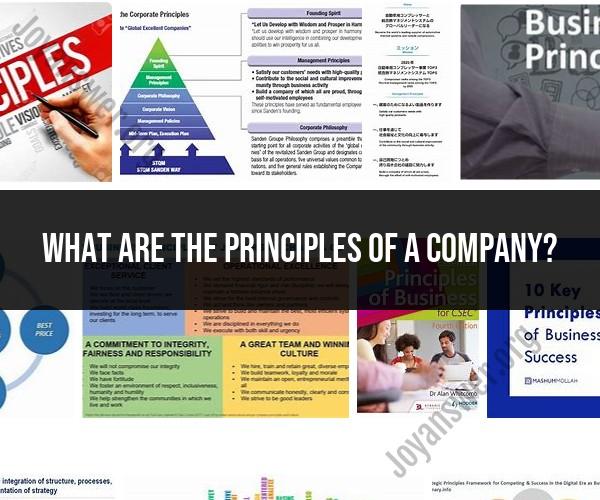What are the principles of a company?
The principles of a company, often referred to as its core values or guiding principles, are the fundamental beliefs and philosophies that shape the company's culture, behavior, and decision-making processes. These principles serve as a compass for employees, leaders, and stakeholders, guiding them in their actions and interactions. While the specific principles may vary from one company to another, here are some common principles that many companies uphold:
Integrity: Upholding honesty, transparency, and ethical behavior in all business dealings, and keeping promises and commitments to customers, employees, and partners.
Customer Focus: Prioritizing the needs and satisfaction of customers and clients, and striving to deliver high-quality products or services that meet or exceed their expectations.
Innovation: Encouraging creativity and embracing innovation to stay competitive, adapt to changing markets, and continuously improve products and processes.
Teamwork and Collaboration: Promoting a culture of cooperation, open communication, and collaboration among employees and departments to achieve common goals.
Respect: Treating all individuals with respect, dignity, and fairness, regardless of their background, beliefs, or roles within the organization.
Responsibility and Accountability: Taking ownership of one's actions and decisions, being accountable for results, and fulfilling obligations to stakeholders.
Quality: Committing to delivering high-quality products or services, and striving for excellence in all aspects of the business.
Inclusivity and Diversity: Embracing diversity and fostering an inclusive workplace where employees from different backgrounds and perspectives are valued and respected.
Environmental Responsibility: Demonstrating a commitment to sustainable and environmentally responsible business practices, reducing environmental impact, and promoting eco-friendly initiatives.
Community Engagement: Engaging with and contributing positively to the communities in which the company operates through philanthropy, volunteering, and social responsibility initiatives.
Continuous Improvement: Encouraging a culture of learning and development, where employees are empowered to seek opportunities for personal and professional growth.
Innovation: Embracing creativity and innovation to drive progress and stay ahead in a competitive market.
Profitability: Striving for financial success and profitability to ensure the company's long-term viability and the ability to reward employees and shareholders.
Safety: Prioritizing the safety and well-being of employees, customers, and the public, and maintaining safe work environments.
Adaptability: Being flexible and adaptable in response to changing market conditions, customer preferences, and technological advancements.
These principles collectively define the company's culture and serve as a foundation for decision-making and actions. They guide employees in their daily work and interactions and help build trust with customers, partners, and the broader community. Companies often articulate these principles in mission statements, codes of conduct, and other official documents to ensure alignment and understanding among all stakeholders.












